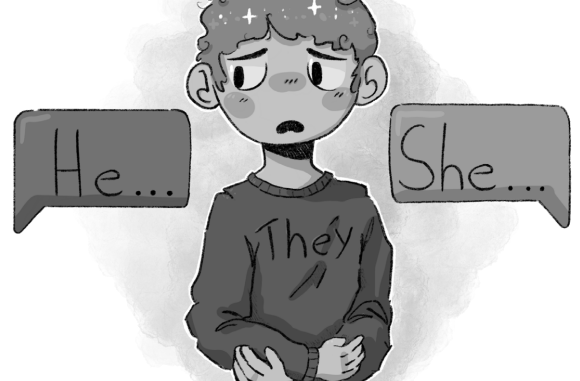
Navigating Lewis & Clark College as a genderqueer person is already difficult, but there are things that many LC students do that make life for me even more insufferable. When it comes to gender identity, I am in a unique and vulnerable position. To many, I “look like” a man, but I am not a man. Despite this, many LC students — mostly cisgender women — believe that it is socially acceptable to use me as a proverbial punching bag for their frustrations with men, including common feminist critiques of men’s actions like mansplaining.
I feel it unnecessary to explain in detail how gender identity is different from gender expression, but for those of you who do not know, how one expresses their gender on the outside may not line up with how they feel about themselves internally. It also does not necessarily line up with the gender category you might put them in subconsciously.
LC students often categorize me as a man based on my appearance. They say I “look like” a man, but I want to question that. What does a man look like? How do you know that your image of a man is consistent with all men? How do you know that you are placing everyone in the right category, so as to not misgender them?
These questions much of the time go unanswered — if they are asked at all. However, they are important to ponder. Please do not leave them as intellectual exercises; people like myself live by asking these questions and understanding the system in which we live.
An irritating phenomenon that results from this lack of introspection is the way in which cisgender people will use my appearance to question what I say and do. For example, I have worked at LC’s mailroom for three and a half years. I know what I am doing there and I can admit when I do not. Once, though, someone came up to me at work and assumed I was mansplaining to them how to do X, Y or Z.
Although they did not say it explicitly, I felt as though their internal dialogue was that I was “mansplaining” to them. This person did not know who I was other than that we shared a class together, yet they likely assumed that I was a man based on my appearance. It should go without saying that my appearance does not define my gender identity. I feel as though they felt their categorization of me as a man was justified because they were critiquing me for “mansplaining” to them about mail.
You have no right to assume things about me, even if veiled under a feminist critique of men and their behavior. You serve to make those hierarchical structures more entrenched in our culture when you operate this way, whether you are cisgender or not. Genderqueer people, in my experience, are just as likely to assume I am a man as anyone else — no one is immune to this pitfall (including myself). If your feminism functions based on someone’s appearance (i.e., if they “look like” a man) and not on the hierarchical power structures that define our culture, then it is not feminism.
Subscribe to the Mossy Log Newsletter
Stay up to date with the goings-on at Lewis & Clark! Get the top stories or your favorite section delivered to your inbox whenever we release a new issue.

Leave a Reply